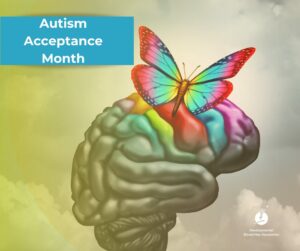When it comes to mental health, discussions often revolve around anxiety, depression, and other common conditions within the general public. However, there is an overlooked intersection when it comes to stigmas surrounding mental health – individuals with developmental disabilities. Research suggests that up to 59% of people with developmental disabilities experience at least one co-occurring mental health condition. By comparison, roughly 22% of the general public identify with a mental health issue. That’s a big gap.
Autism spectrum disorder, in particular, is frequently associated with mental health challenges. Individuals with ASD often struggle with sensory sensitivities, difficulties in social interaction, and repetitive behaviors, which can exacerbate anxiety and lead to depressive symptoms.
Living with a developmental disability presents unique challenges that can significantly impact mental well-being. Social stigma, communication barriers, limited access to resources, and difficulties in daily functioning are just a few factors that contribute to heightened vulnerability to mental health issues.
The bottom line is many people with developmental disabilities have mental health issues and need support when dealing with them. Just because they have developmental disabilities, it doesn’t mean they don’t understand their feelings.
Many factors contribute to mental health challenges for people with IDD. They may have difficulty expressing thoughts and emotions, leading to frustration and feelings of isolation. Limited social skills can exacerbate feelings of loneliness and low self-esteem. It does not help that people with developmental disabilities are at a higher risk of experiencing bullying and discrimination, further compromising their mental well-being.
In addition, families and caregivers of people with developmental disabilities may experience high levels of stress, which can impact the overall family dynamic and mental health of both the individual and their caregivers. Depending on where the person is, limited access to mental health or caregiving services can make support difficult at best.
How do we help mitigate mental health issues for people with IDD?
We need to educate the public, healthcare professionals, educators, and caregivers about the intersection of developmental disabilities and mental health. It is essential to reduce stigma and promote understanding. We can be proactive and work on early identification and intervention. This can help mitigate the impact of mental health issues and improve outcomes.
We can ensure that mental health services are accessible, inclusive, and tailored to the unique needs of individuals with developmental disabilities. That also means creating supportive environments that foster social inclusion, independence, and self-advocacy. Empowering individuals with developmental disabilities to advocate for themselves and participate in decisions regarding their care is paramount.
By fostering understanding, increasing access to support services, and promoting inclusivity, we can work towards improving the mental health outcomes and quality of life for this often overlooked population. It’s time to amplify their voices, break down barriers, and prioritize their mental well-being.



